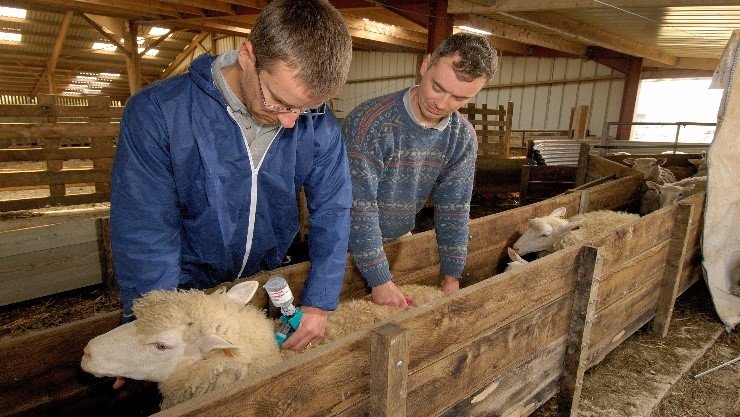Introduction
Vaccination is one of the most important health measures that must be taken to protect the herd from diseases. What is meant by vaccination? Does it have a negative impact on the health of the herd? What are the factors that the success of the vaccination process depends on?
Answers to these and other questions are in the following lines.
Definition of Vaccination
It is giving the animal a vaccine that contains the dead or weakened microbe that causes the disease, to stimulate the immune system to form antibodies that protect the animal from contracting this disease in the future.
Timing of Vaccination

Vaccination is usually carried out periodically at a specified time each year, which is before the expected time of the onset of the disease. Some vaccines are given during the last month of pregnancy, so that the newborns acquire immunity from the mother through colostrum, the suitability of weather and temperature is also taken into account, and so the health condition of the herd. Vaccination may be given urgently when there is an outbreak of the disease, or upon the emergence of a new disease.
Side Effects of Vaccination
Good quality vaccines are largely safe and do not cause health problems to the herd. However, there are some minor side effects that can result from the vaccination process, the most important of which are:
- Fever and decreased appetite.
- The occurrence of some local reactions, such as inflammation at the injection site.
- Decline in production.
These symptoms are temporary and disappear within a few days and do not need treatment. The vaccines do not pose a risk to pregnant livestock when you follow the manufacturer’s instructions.
Consumption of Meat and Milk from Vaccinated Livestock
When using some vaccines, it is possible to consume milk and livestock meat immediately after vaccination, but when using other vaccines, you must wait a certain period before eating milk and meat, this period is known as the “withdrawal period”, in all cases you should follow the instructions of the vaccine manufacturer.
Important Things for the Success of the Vaccination Process
The success of vaccination depends on factors related to the herd, the vaccine, and the surrounding environment.
- The herd should be free from diseases and free from internal and external parasites.
- The feed of the herd should be good and contain adequate amounts of protein, energy, vitamins, and minerals necessary for the functioning of the immune system.
- Stressing the herd with some procedures such as transporting, claws trimming, and shearing the wool, should be avoided for a period of not less than two weeks before and after the vaccination process.
- The administration of drugs that may suppress the animal’s immunity or affect the effectiveness of the vaccine should be avoided..
- Only good quality vaccines should be used..
- Vaccine should be stored at the appropriate temperature before and during the vaccination process.
- Vaccination should be used by trained persons, taking into account sterilization precautionss.

- The herd should not be exposed to harsh weather such as high or very low temperatures, rain, or strong winds two weeks before and after vaccination.
- A veterinarian should be consulted regarding the emergency vaccination procedure when a disease spreads, even before the predetermined time for vaccination is reached.






Comments
No comment yet.